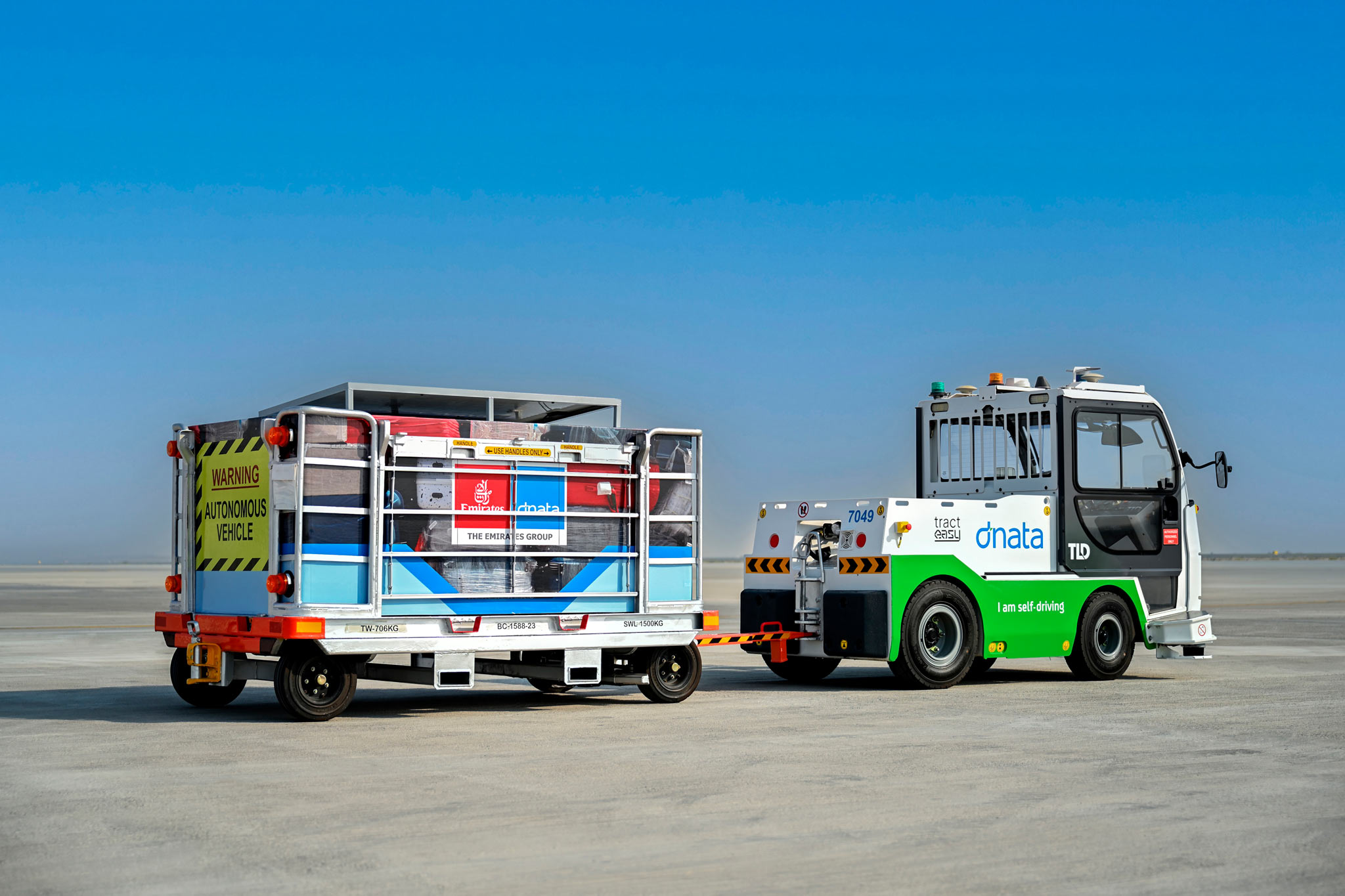- Fleet of six electric baggage tractors deployed at Dubai World Central – Al Maktoum International.
- Initiative represents an investment of AED 6 million (€1.4 million).
- Technology to improve workforce productivity & reduce safety risks.
Dnata, a leading global air and travel services provider, has deployed a fleet of autonomous vehicles at Dubai World Central – Al Maktoum International (DWC), introducing next-generation technology in ramp operations. The rollout marks a significant step in the automation of ground handling services – one of the aviation industry’s most labour-and time-intensive areas.
Enhanced efficiency and safety
Dnata now operates six electric tractors (the EZTow model developed by TractEasy) at DWC. Traditionally, baggage is transported between the terminal and aircraft by human drivers, each operating under tight time constraints. The new autonomous vehicles streamline this process by towing up to four baggage containers (ULDs) at a time at speeds of up to 15 km/h, following pre-defined routes.
With these new vehicles now in service, and as they become integrated into operations, staff who previously drove baggage tractors can be reassigned to more complex, value-added tasks, supporting faster turnarounds. At the same time, autonomous driving reduces the risk of human error, making airside operations safer for everyone on the ramp.
From controlled trials to live airport operations
The AED 6 million (€1.4 million) project deployment begins with Level 3 autonomy, which involves minimal human oversight. This will upgrade to Level 4 autonomy, defined by full self-driving capabilities in controlled environments, in early 2026.
The rollout follows over a year of collaboration between Dnata, TractEasy, Dubai Airports and the UAE General Civil Aviation Authority (GCAA). The parties have been working together to create a new regulatory framework for autonomous vehicle operations in airside environments, which remain largely undefined at a global level.
Building the blueprint for tomorrow’s airport
Beyond its day-to-day role, Dnata will use this deployment as a testbed to trial and refine different operating models for autonomous ground handling. The aim is to identify the most effective approach for wider rollout, especially as DWC expands into what is set to become the world’s largest airport, with capacity for up to 260 million passengers and 12 million tonnes of cargo annually. The insights gained will help shape how automation is built into the core of future airport operations at DWC.
A game-changer for mobility
“This is an important step forward for both dnata and the wider aviation industry,” said Jaffar Dawood, Divisional Senior Vice President for UAE Airport Operations at dnata.
“While autonomous vehicles have largely been limited to trials, this deployment brings the technology into regular, day-to-day operations. As global travel continues to rebound and operational demands increase, automation could be key to building smarter, safer and more resilient infrastructure.”
“Autonomous GSE adoption is taking off,” said Rich Reno, CEO, TractEasy. “TractEasy is proud and excited to partner with an industry leader like Dnata and blaze a safe and efficient autonomous trail for others to follow.”
Autonomous ground support equipment (GSE) has become a key focus area for innovation in recent years. According to IATA, such trials are currently underway in more than 15 countries, though most remain in early testing phases or restricted to small-scale pilots.
Dnata’s latest deployment positions it at the forefront of this shift and builds on its broader innovation agenda. Recent highlights include the successful integration of autonomous drones into its warehouse operations, which significantly reduced processing times and increased accuracy in shipment tracking.



